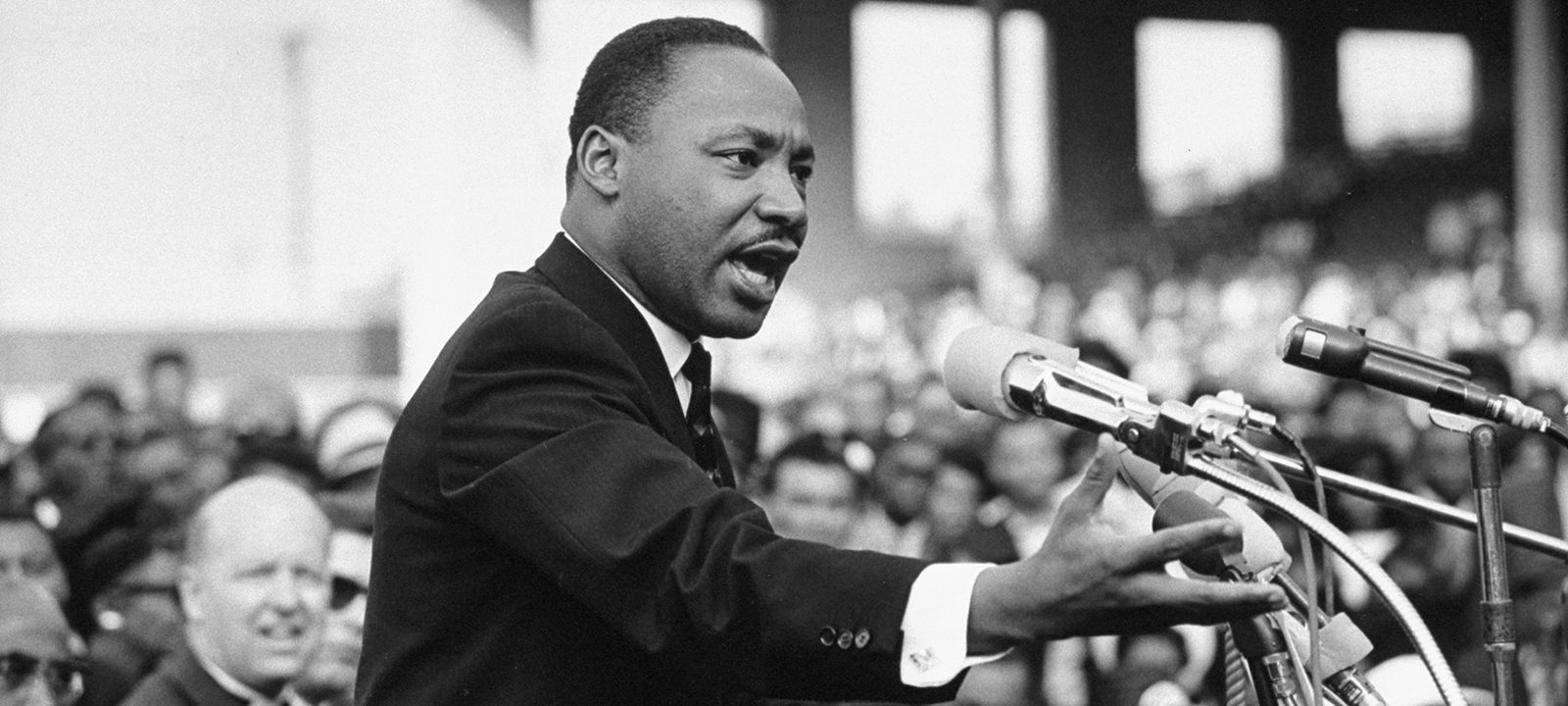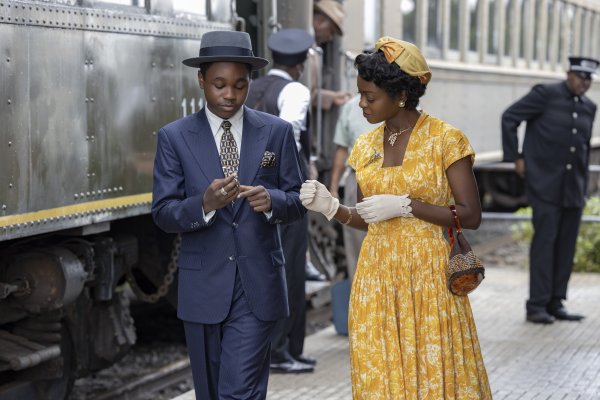
In a crucial scene from “Till,” Emmett Till’s mother gives him a ring worn by his dead father, which will help identify his body. readthespirit.com
MOVIE REVIEW:
Till (PG) is at The Oriental Theatre, Marcus Southgate Cinema, and AMC Mayfair Mall 18, in Milwaukee, through Wednesday. Nov. 9.
Emmett Till rises, as does his astonishingly resilient mother. All of 14 years old, he became, in death, the first icon of Civil Rights martyrdom. Mamie Till-Mobley transformed into the first luminous hero of the movement. In Chinonye Chukwu’s new film drama Till, we now finally see, hear, and feel what Mamie endured, how she persevered, and redeemed her son’s horrendous lynching in the summer of 1955. Because Emmett dies so early in the story, it’s up to Mamie to carry through this trail of tears, also a matter of history. Danielle Deadwyler’s Sisyphean performance feels indelibly resonant — as we see her push her spiritual rock up the mountain the Rev. King would invoke, she exposes and agitates the movement’s original embers, because her son’s is a death that will never die.
I wondered why it took this long for a major dramatization of this story. Perhaps the subject matter was too charged, too raw an indictment of American racism for even a Black American director to feel comfortable, as courageous as someone like Spike Lee has been over the years.
Chuckwu is Nigerian-American, so she has an innate sense of slavery’s historical lineage reaching back to The Middle Passage and simultaneously stands a half-step removed from the inherent American guilt over the nation’s Original Sins (along with the homeland-steal and genocide of Native Americans). Given the depicted event’s dagger-like historical inflection point, the behavior of virtually all the whites in the film can make a Caucasian’s skin crawl. And a black American director may risk vulnerability to, in our current polarization, unfair charges of overplaying the victim card. Such is the potency Till successfully traffics in.
Plus, released now, the film evinces superb timing in that the Emmett Till Anti-Lynching Act was finally passed in March 2022, making lynching a federal hate crime, punishable by up to 30 years in prison. This is popular culture’s dramatic articulation of that legislation’s gravitas, a historical bookend to the Till family legacy first formalized with the enactment of the precipitous Civil Rights Act in 1957. That’s not to suggest a closed case, rather the foundation of resolve, as the Civil Rights struggle continues with newfound urgency today.
As I watched, I grew also in wonderment over where Deadwyler came from. You’d hope for a performance of this range, nuance, intensity, and stamina from very few contemporary African American actresses. Viola Davis perhaps, but she’s not young enough to play a 34-year-woman. So, this must be the Casting Coup of the Year, at the least. More, the burning fear and desperate fire in Deadwyler’s eyes, the wails from her primal depths, and finally her steely determination make this the finest acting performance I’ve seen this year, or perhaps in several, regardless of gender. Alert Oscars.
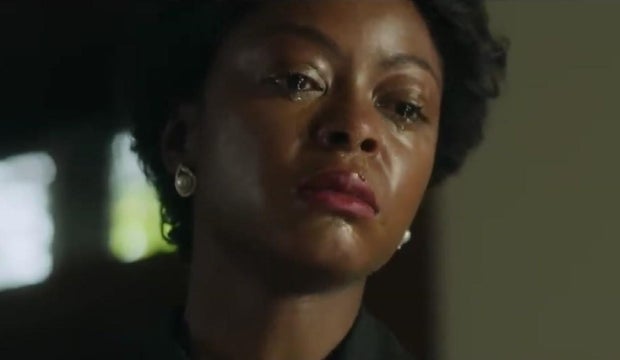
Danielle Deadwyler’s elegantly power-packed performance as Mamie Till-Mobley carries the magnetic force of love and resolve in “Till.” CBSnews.com
Deadwyler’s biggest credits to date include the 2021 western The Harder They Fall and the Oprah Winfrey TV soap-opera, The Haves and Have Nots. Talk about a starburst.
The film also marks the full emergence of screenwriter-director Chukwu, whose previous biggest credit was Clemency, the 2019 death-row drama starring Alfre Woodard as a prison warden dealing with an inmate’s imminent execution. That film was also based on a historical case, of Troy Davis, a prisoner executed in 2011. Chukwu received the U.S. Dramatic Grand Jury Prize at the 2019 Sundance Film Festival, the first Black woman to do so.
Till focuses on Mamie even as we see her high-spirited son’s social vibrancy amid burgeoning teen hormones, even spontaneously dancing with his mother, a joyous moment oddly fraught with foreshadowing. When he accepts an invitation to visit his cousins in Mississippi, his future is vaguely prophesized by Mamie’s mother (played by a frowzy Whoopie Goldberg) who fled North from that state long ago. The first emotional tripping point comes when Emmett (played with apple-cheeked good-naturedness by Jaylyn Hall) says goodbye at the waiting Southbound train, against his mother’s wishes. She intuits she may not see her only child alive again.
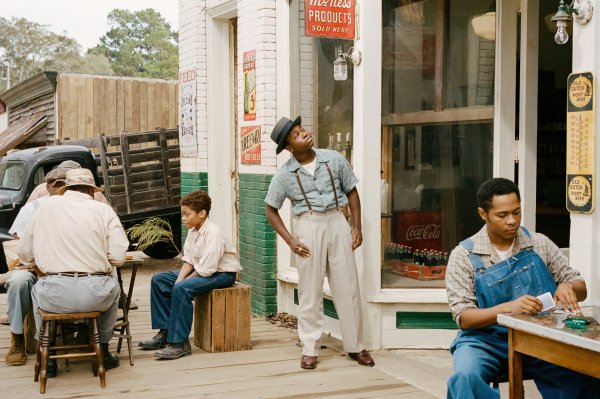
As the title character, 14-year-old Emmett Till (Jaylyn Hall) pauses moments before he makes a fatal mistake in a Mississippi grocery store. movieinsider.com
Soon, in a small Mississippi hamlet, Emmett is struck by the looks of a brunette white cashier, and gushes, “You look like a movie star!” He pulls out his wallet to show the photo of his fantasy lady, Hedy Lammar.
Then, as Carolyn Bryant indignantly follows him out the door (why?), he turns and foolishly wolf-whistles at her. His stunned cousins shudder, sensing their naïve Northern kin’s fate is threatened. The director exercises fine but properly noirish restraint in depicting Emmett’s abduction, torture and murder, by the woman’s husband and a friend.

The ruins of Bryant’s Grocery and Meat Market in 2009. Wikipedia.com
Dire dread and drama catapult the story – when Mamie hears the news her deeply-pooled brown eyes absorb the shock until she faints, her only moment of weakness. Another stunning moment of emotional nakedness arrives at the murder trial when Mamie must explain that the bloated, mutilated body was in fact her son. In a few agonizing moments, you see and feel her take a rollercoaster dive to hell and back, while maintaining a semblance of dignity. She then steels herself for her remarkably tender and convincing answer.
In that moment, she’s managing a stage of grief with uncanny courage and fortitude. By now the actress is forging the embodiment of this mother’s legacy, evolving into a Civil Rights pioneer, an arc of transformation that inspires awe. Her decision to show her son in an open casket galvanizes America’s horror of racial crimes.
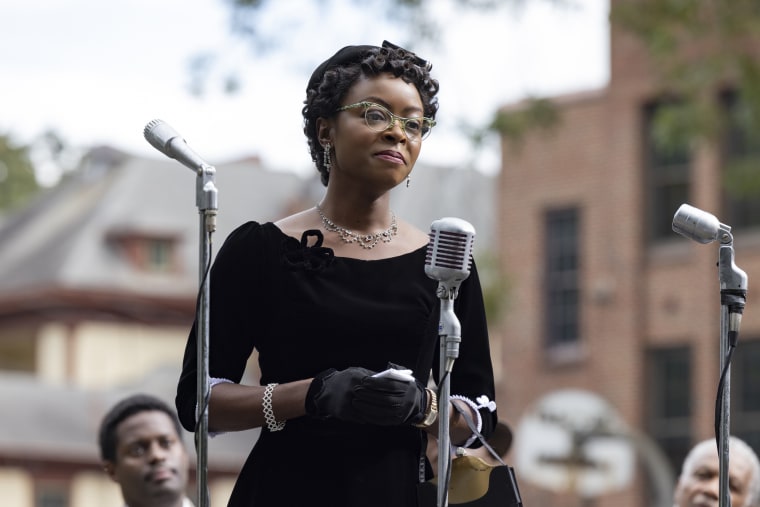
Mamie Till-Mobley (Daneille Deadwyler) tells an NAACP-sponsored gathering that “we can never forget” her son’s murder. NBC News
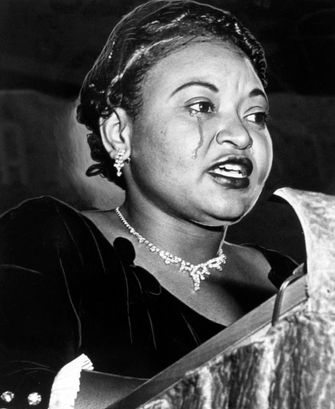
The real Mamie Till addresses an audience in her newfound role as activist. Vox.com
The film’s informational coda underscores the point of the new federal hate crime legislation. Till’s murderers were found not guilty, by an all-white Mississippi jury. Later, in a paid magazine interview, the men admitted to the crimes, but could no longer be tried for it. Carolyn Bryant would admit she had lied under oath by saying Till propositioned and physically accosted her.
Mamie died in 2003. Yet, in the film’s closing scene, this mother’s love abides. We sense the arduousness of her journey feeds the light shining from within, towards the mountaintop.
_______________



